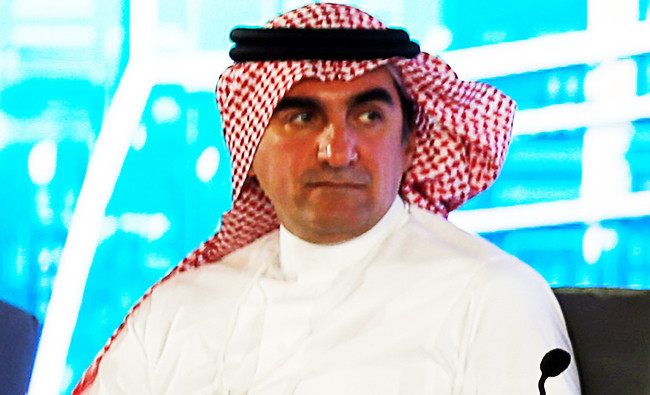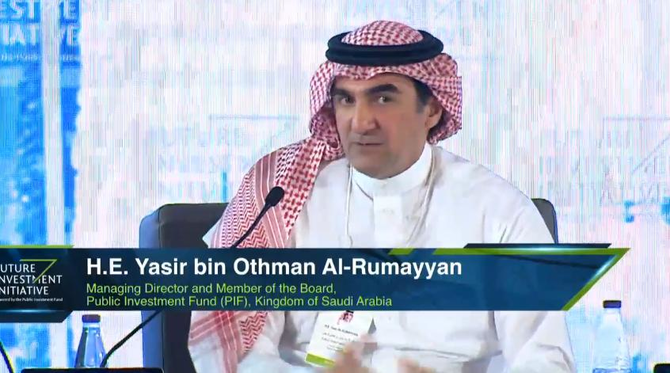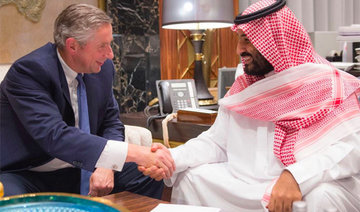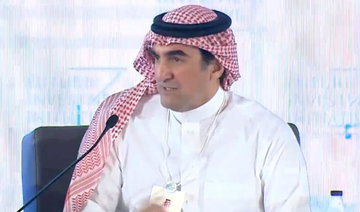RIYADH: Saudi Arabia’s Public Investment Fund (PIF) is looking for further international partnerships as part of its ambitious aim to become the largest sovereign wealth fund in the world.
Yasir Al-Rumayyan, PIF managing director, said that global investment alliances would be a central part of a four-legged strategy.
He was speaking as PIF formally announced a $20 billion alliance with the US investment fund BlackRock to put money into what he called “conventional investment” like infrastructure and large-scale construction projects, and on top of the $45 billion agreed with Japan’s SoftBank.
“We will continue to see partnerships with the rest of the world, and conventional investments will not go away,” he said at the opening session of a major conference hosted by the PIF in Riyadh, the Future Investment Initiative.
He added that PIF is targeting annual returns of between 3 and 9 percent across its portfolios in the long term.
“PIF is a long-term fund. We are looking beyond cyclicality,” he said.
Al-Rumayyan spelled out the rest of the strategy. “We want to grow and diversify revenue across all investments. We want to localize the economy of Saudi Arabia for the future employment of citizens, and we want to expand in new sectors, like waste management, real estate and entertainment.”
Panelists included the CEO of Saudi Aramco, Amin Nasser, BlackRock Chairman Larry Fink, IMF Managing Director Christine Lagarde and Victor Chou, CEO of First Eastern Investment Group.
They were quizzed on their outlook for investment returns as individuals and states worldwide grapple with how to ensure sufficient retirement funds during an extended period of low growth across global economies.
Al-Rumayyan said that some assets could reach annual returns in the low teens.
“We don’t want to be a sitting duck to be shot down by only being in conventional investments. We want to go beyond — that is what Vision 2030 is all about,” he said.
He also revealed that he wants the Future Investment Initiative to become an annual event, which would help the Kingdom prepare for the future.
Questioned on the long-term prospects for the oil economy in the face of the renewable and alternative fuels industry, Nasser said it would take decades for the oil and gas industry to be significantly affected by these changes.
BlackRock’s Fink warned: “Long-term growth rates are decelerating quite rapidly and this is going to present pension funds with bigger liability issues — but this is also one of the reasons we have to address this issue of retirement today with expected returns — whether it’s 4, 6 or 8 (percent).
“It means you have to put money away sooner to get to the expected pool of money you want in retirement.”
Asked about his own forecasts for what was possible and realistic as an investment return, he said: “The BlackRock Investor Institute came out with a 10-year forecast of 4 per cent with a balanced portfolio. I tend to think it will be closer to 6 percent. We’re in a world of low inflation.”
Hundreds of the biggest names in global business are attending the event in Riyadh, which concludes tomorrow.
Saudi Public Investment Fund looks for more global alliances
Saudi Public Investment Fund looks for more global alliances

Saudi PIF assets triple with 390% surge since 2016, 2030 target raised

- Record-breaking growth fuels job creation, sector expansion, and a powerful shift beyond oil
RIYADH: Saudi Arabia’s Public Investment Fund has recorded a 390 percent surge in assets under management since the launch of Vision 2030, according to the initiative’s latest annual report.
PIF’s assets have soared from $160 billion in 2016 to $941.3 billion in 2024, surpassing its annual target of $880 billion and underscoring the fund’s rapid growth trajectory under the Kingdom’s transformative agenda.
Building on this momentum, the wealth fund has revised its 2030 goal, raising its asset management target from $1.87 trillion to $2.67 trillion. The updated ambition reflects the fund’s strengthened position and growing influence in shaping Saudi Arabia’s future economy.
Between 2016 and 2024, PIF posted a compound annual growth rate of 22 percent, highlighting its consistent ability to generate strong returns while advancing national development priorities.
Driving forces behind PIF’s expansion
Following its restructuring under Vision 2030, PIF has transformed from a traditional sovereign wealth fund into a globally recognized driver of economic diversification and innovation.
The fund’s growth has been propelled by a proactive, diversified investment approach, with 40 percent of its portfolio allocated to Saudi companies and giga-projects. Simultaneously, it has made strategic international investments across high-potential sectors.
This balanced strategy has contributed to the expansion of priority industries within the Kingdom, including tourism, mining, culture, logistics, and technology, supporting efforts to build a resilient, diversified economy.
Economic impact and sectoral growth
PIF’s strategic investments have not only boosted economic growth but also stimulated private sector participation, created employment opportunities, and attracted foreign direct investment.
By 2024, the fund’s initiatives had contributed to the creation of 1.1 million jobs, a significant leap from 77,700 direct and indirect jobs recorded in 2021. Over the same period, the number of companies established with PIF’s support more than doubled, rising from 45 to 93 across 13 strategic sectors.
The fund achieved 48 percent local content across its projects by 2024, highlighting its strong commitment to driving domestic economic growth.
Between 2021 and the third quarter of 2024, PIF attracted more than $37.33 billion in private investments across a range of initiatives, according to the report.
Through its Private Sector Hub initiative, it published over 200 opportunities during this period, representing a total investment value of $10.67 billion.
In addition, more than 300 contractors have been pre-qualified, and over 200 small and medium-sized enterprises have been trained to collaborate with companies across PIF’s portfolio.
PIF’s role in strengthening Saudi Arabia’s non-oil economy has been pivotal.
According to the report, non-oil sectors accounted for 51 percent of the Kingdom’s real gross domestic product by 2024, a key milestone in achieving Vision 2030 goals.
The fund’s influence is evident in the launch of several megaprojects aimed at redefining the Kingdom’s economic landscape, ranging from world-class tourism destinations to advanced industrial zones.
PIF also played a crucial role in advancing financial sector reforms. The number of licensed asset managers in Saudi Arabia rose sharply from just five in 2019 to 36 in 2024, reflecting the Kingdom’s growing investment landscape and financial market sophistication.
Strengthening financial resilience
The fund has reinforced its financial base to support its ambitious investment strategy, highlighted by the transfer of 8 percent of Aramco shares. This move reduced the government’s direct ownership in the oil giant to 82.186 percent, enhancing PIF’s asset strength and investment capacity.
In addition, PIF secured $15 billion in syndicated credit facilities from 23 global financial institutions, significantly boosting its liquidity and financial flexibility. These initiatives align with PIF’s strategic objectives of developing new sectors, localizing knowledge and technology, and generating sustainable, high-quality employment opportunities across the Kingdom.
Global recognition
PIF’s transformation has not gone unnoticed on the international stage. The fund was named the world’s No.1 sovereign wealth fund brand by Brand Finance, with its brand value estimated at $1.1 billion.
Adding to its accolades, PIF swept four awards at the 2024 Middle East Bonds, Loans & Sukuk Conference, including Best Sukuk Deal, Best Landmark Deal, Best Semi-Sovereign Treasury and Funding Team, and Best Deal in Islamic Capital Markets.
Capital markets expansion
Saudi Arabia’s capital markets have grown in tandem with PIF’s rise, playing a critical role in broadening the nation’s economic base since the launch of Vision 2030.
Regulatory reforms—such as updates to the Companies Law and Government Tenders and Procurement Law—have enhanced transparency, strengthened investor confidence, and paved the way for a surge in initial public offerings.
The Saudi Exchange has seen remarkable expansion, with the number of listed companies increasing from 205 in 2019 to 353 in 2024. Foreign investor ownership more than doubled, reaching $112.8 billion in 2024 compared to $52.8 billion in 2019, while non-Saudi portfolio ownership grew from $29.3 billion in 2016 to $131.5 billion.
The number of individual portfolios on the Saudi Exchange also rose sharply, climbing from 9.2 million in 2016 to 13 million by 2024.
Meanwhile, Tadawul’s market capitalization (excluding Aramco) grew from 66.5 percent of GDP in 2019 to 86.7 percent in 2024, indicating the increasing maturity and depth of Saudi Arabia’s capital markets. The banking sector mirrored this growth, with total assets rising from $693.3 billion in 2019 to $1.12 trillion by the second quarter of 2024.
These developments have positioned Saudi Arabia’s financial sector as one of the most dynamic and accessible in the region, offering expanded opportunities for both local and global investors.
Reflecting this confidence, international credit rating agencies reaffirmed Saudi Arabia’s strong economic outlook in 2024. Moody’s assigned an AA3 rating, Fitch rated the Kingdom at “A+,” and S&P Global Ratings gave it an “A/A-1” rating, all with stable outlooks.
Beyond Vision 2030
As the Kingdom prepares to enter the final phase of Vision 2030 delivery in 2026, the focus will increasingly shift toward building a sustainable and resilient private sector. Key priorities include reducing reliance on government support while fostering growth through regulatory enhancements, infrastructure development, and targeted investments.
Saudi Arabia envisions the private sector playing a leading role in advancing the economy, particularly in high-impact fields such as advanced manufacturing, artificial intelligence, and the digital economy.
By empowering private enterprises, the Kingdom aims to achieve its target of generating 65 percent of GDP from private sector activities, positioning it as a critical driver of sustainable growth in the decades beyond Vision 2030.
Pakistan’s forex reserves triple since early 2023 as central bank targets $14 billion

- Central bank governor says Pakistan’s reserves have seen both qualitative and quantitative improvement
- Governor Jamil Ahmed was briefing executives of global financial and investment institutions in the US
KARACHI: Pakistan’s foreign exchange reserves have more than tripled since early 2023, driven by a surplus in the external current account rather than fresh borrowing, the top central bank official said, according to a statement on Saturday, as the country targets $14 billion in reserves by June.
Pakistan’s forex reserves had touched critically low levels two years ago, giving it an import cover of less than a month. Faced with the threat of a sovereign debt default, the country secured a $3 billion short-term International Monetary Fund (IMF) bailout, tightened fiscal and monetary policies, restricted imports and allowed greater exchange rate flexibility.
Governor of the State Bank of Pakistan, Jameel Ahmad, told senior executives from global financial and investment institutions on the sidelines of the IMF-World Bank Spring Meetings in Washington the country’s external buffers had seen a “substantial qualitative as well as quantitative improvement” since then, as he briefed them about the current economic situation.
“Unlike previous episodes of reserve build-up, the ongoing rise in external buffers is not due to any further accumulation of external debt,” he said. “In fact, Pakistan’s public sector external debt, both in absolute terms and as a percent of GDP, has declined since June 2022.”
Ahmad added that the central bank had been able to strengthen reserves through foreign exchange purchases in the open market, supported by a current account surplus.
“The SBP is targeting to increase [forex] reserves to $14 billion by June 2025,” he said.
Ahmad said Pakistan had made tangible progress in stabilizing its economy, crediting a prudent monetary policy and sustained fiscal consolidation efforts for the improvement.
He informed that headline inflation had declined sharply over the past two years, reaching a multi-decade low of 0.7 percent in March 2025, while core inflation had also dropped from above 22 percent to a single digit and was expected to moderate further in the coming months.
Pakistan’s IT exports seen reaching $4 billion in FY25 as industry seeks tax relief

- Country’s software association calls IT industry the only sector with 75% trade surplus
- Government has set an ambitious target of reaching $10 billion in IT exports by 2029
KARACHI: Pakistan’s information technology (IT) sector expects exports to reach $4 billion in the current fiscal year and seeks regulatory reforms and a 10-year tax holiday to sustain growth momentum, said the country’s top software association on Saturday.
The IT sector is one of Pakistan’s priority industries as the country looks to boost export revenues and stabilize its external accounts.
Under the government’s “Uraan Pakistan” initiative, launched last year in December, Islamabad aims to raise IT exports to $10 billion by 2029.
Industry leaders say IT remains one of the few sectors capable of exponential growth despite the broader economic challenges.
“Muhammad Umair Nizam, Senior Vice Chairman of Pakistan Software Houses Association (P@SHA), has apprised that information technology has become the fastest growing export industry of Pakistan – and, the country is set to achieve $4 billion in its IT exports for the FY25,” the software association said in a statement, adding that Pakistan’s IT exports stood at $3.2 billion in the last fiscal year with the prospect for a 25% year-on-year growth.
However, P@SHA warned regulatory bottlenecks and inconsistent tax policies were hampering the sector’s expansion at a time when new tech sub-sectors were emerging.
The association said it had also submitted detailed budget proposals to the government, seeking a facilitative framework that includes streamlined foreign exchange regulations, banking sector support, removal of sales tax anomalies and accelerated development of special technology zones and IT parks.
Pakistan’s IT industry is the only sector with a trade surplus of around 75%, the statement said, underlining its potential to create jobs, develop skilled human capital and reduce the trade deficit on a sustainable basis.
The software association also raised concerns over income tax disparities between salaried employees and freelancers, saying the current structure discourages formal employment and needs urgent correction in the upcoming federal budget.
Saudi Arabia’s webook.com eyes billion-dollar valuation, global expansion

RIYADH: Saudi Arabia-based event booking platform webook.com has unveiled an ambitious roadmap aimed at achieving a billion-dollar valuation and a future listing on the stock exchange.
Positioning itself as the “ultimate super app for fun,” the company is rapidly expanding its offerings beyond event ticketing. New services include flight and hotel bookings, restaurant reservations, sports facility access, and live streaming. The platform is also leveraging cutting-edge technology and forging strategic partnerships to accelerate its global reach.
In an interview with Arab News, Nadeem Bakhsh, CEO of webook.com, highlighted the company’s growth strategy, structured around four key pillars: diversification, innovation, globalization, and automation.
“Our goal is to become the ultimate super app for fun worldwide, helping people discover and book experiences that bring them together,” Bakhsh said.
Strategic blueprint for growth
Webook.com’s roadmap—referred to internally as DIGA—outlines a methodical approach to scaling the business and establishing a global presence.
The first pillar, diversification, focuses on broadening revenue streams by integrating travel and hospitality services such as flights, hotels, and dining. The company is also fostering fan communities to deepen user engagement.
Innovation plays a central role, with webook.com deploying advanced technologies to streamline the user experience. New features include ticket auctions, built-in resale options, anti-scalping protections, and interactive community tools, all designed to offer a secure and seamless platform.
Under its globalization initiative, webook.com has already launched operations in eight countries and continues to grow its international team to support further expansion.
Meanwhile, automation is enabling the company to scale efficiently. By optimizing its engineering and operational infrastructure, webook.com aims to deliver a frictionless customer experience while supporting its broader growth ambitions.
Rapid international expansion and user growth
The event platform is rapidly expanding its international footprint, claiming a user base of more than 7 million across 160 countries and access to over 520 global events since its launch.
The company credits its rapid growth to an unwavering focus on user experience and strategic collaborations.

“User experience is at the heart of our success,” said Bakhsh. “We have built a strong design and research team that benchmarks best practices from industries such as banking, e-commerce, transport, and social networks.”
In addition to refining its platform’s usability, webook.com has developed tailored tools for event organizers and partners, ensuring system stability even during peak demand.
“Unlike recently publicized high-profile concerts like Taylor Swift and Coldplay, where overwhelming demand left fans frustrated, our infrastructure guarantees high performance,” the CEO noted.
Lifestyle integration, dining partnerships
Expanding its footprint beyond ticketing, webook.com is weaving lifestyle services into its ecosystem. A notable partnership with dining reservation platform Servme aims to enhance the post-event experience by linking event attendees with nearby restaurants in Saudi Arabia.
“We have 8 million users, many of whom actively seek entertainment and dining experiences,” Bakhsh said. “During peak season, we process an average of 100,000 tickets per day, with a high of 150,000 on a single day. Each ticket presents an opportunity to upsell dining options.”
Using data-driven personalization, webook.com recommends dining venues based on users’ tastes and spending habits.
“Seamless integration allows users to book restaurants near their event venue effortlessly, enhancing their overall experience while driving traffic to restaurant partners,” Bakhsh explained.
Boosting digital streaming capabilities
In parallel, the platform is advancing its digital streaming features, bolstered by exclusive rights to Riyadh Season events.
“Our streaming service is built on a scalable infrastructure that can handle millions of users simultaneously,” Bakhsh said.
To enrich the virtual experience, the company is integrating interactive features such as live polls, real-time chat, and merchandise auctions during concerts.
“Our goal is to offer a virtual front-row experience, ensuring users never miss a moment, whether they are at the venue or streaming remotely,” Bakhsh said.
Looking ahead, webook.com is also building out pay-per-view capabilities for sports events, including boxing, and exploring multi-angle viewing to create a more immersive streaming experience.
Tackling fraud and enhancing security
Ticket fraud remains a widespread issue in the live events industry, and webook.com is taking aggressive measures to address it. Over the past year, the platform has nullified 40,000 black market tickets and shut down more than 5,000 fraudulent accounts.
“We have also launched a verified resale platform, which has facilitated the sale of over 200,000 tickets through official channels,” said Bakhsh.
In addition to digital safeguards, the company is pursuing legal action against major black market platforms.
“While fraudsters continuously adapt, our dedicated anti-fraud team works proactively to stay ahead, ensuring a safe and seamless experience for our users,” he added.
Strengthening sports ticketing presence
Webook.com has recently secured a three-year partnership with the Roshn Saudi League to manage ticket sales for football matches, reinforcing its role in the sports sector.
“This partnership aligns perfectly with our mission to be the gateway for entertainment,” Bakhsh said. “It allows us to strengthen our presence in sports ticketing while providing fans with a seamless booking experience on one platform.”
Future plans include exclusive fan content, loyalty programs, and community-driven in-app features.
“For the league, it ensures a reliable and fraud-free ticketing system while expanding reach through webook.com’s growing user base,” he said.
From local roots to global vision
The company’s journey began under its original name, Halayalla, which Bakhsh said was limiting in terms of international reach.
“Our former and original brand had a very local flair but didn’t translate internationally and wasn’t descriptive as to what we do,” he explained.
Following extensive market research and testing, the company rebranded to webook.com, a move that significantly boosted its global recognition and credibility.
IPO preparations underway
As part of its long-term vision, webook.com is actively preparing for an initial public offering. The company is enhancing its internal governance, aligning with global regulatory standards, and bringing in experienced leadership.
“Over the past year and a half, we have been hiring a CFO with IPO experience and engaging a top consultancy for an IPO readiness assessment,” Bakhsh said.
“Our three-to-four-year timeline for the listing is carefully structured, with every step aligned to ensure a smooth transition to becoming a publicly traded company.”
The company is also working with leading consultants to streamline operations and ensure full transparency under public market scrutiny.
Looking ahead
With operations already established in Morocco and Bahrain, webook.com is now focused on Europe as it charts its five-year growth trajectory.
“Our vision is to make webook.com a household name from Hawaii to Tokyo,” Bakhsh said.
To achieve this, the company plans continued investments in technology, talent, brand development, and platform security—while keeping customer satisfaction at the forefront.
“We remain committed to delivering the best possible experience for our users as the super app for fun,” he said, adding: “Our priority is ensuring users can easily discover, book, and enjoy world-class events effortlessly.”
With its momentum building, webook.com is poised to reshape the global event booking landscape through innovation, security, and a customer-first approach.
FIFA World Cup 2034 a ‘game changer’ for Saudi tourism, experts say

RIYADH: Hosting the FIFA World Cup in 2034 is expected to transform Saudi Arabia's tourism sector and accelerate the nation’s economic diversification, experts said.
The Kingdom was awarded the competition by the sport’s international governing body in December, and is set to hold the event in 15 stadiums across five cities.
Saudi Arabia’s sports tourism sector has been witnessing rapid growth since the launch of Vision 2030 nine years ago, with the Kingdom drawing 2.5 million visitors through 80 international events in the last four years, Tourism Minister Ahmed Al-Khateeb said in February.
Bolstering the tourism sector is one of the crucial goals outlined in Saudi Arabia’s Vision 2030 initiative, as the Kingdom is steadily diversifying its economy by reducing its decade-long reliance on oil revenues.
Saudi Arabia’s ambitious National Tourism Strategy aims to attract 150 million visitors by the end of this decade.

Speaking to Arab News, Federico Pienovi, chief business officer and CEO of New Markets at Globant, said that the mega football event presents immense opportunities for the Kingdom to develop multiple sectors.
“Hosting the FIFA World Cup is a game-changer for Saudi Arabia’s tourism sector. For Saudi Arabia, FIFA World Cup 2034 represents a key milestone in its Vision 2030 strategy, accelerating economic diversification beyond oil by boosting tourism, hospitality, infrastructure, and smart city development,” said Pienovi.
He added that the tournament accelerates the Kingdom’s tourist number ambitions by putting Saudi Arabia on the map for future leisure and business tourism.
Guillaume Thibault, partner and head of sports and entertainment at Oliver Wyman for India, the Middle East and Africa, echoed similar views and said the football gala will be a major catalyst for Saudi Arabia’s economic diversification, attracting over 10 million international visitors.
Thibault added that the event is also expected to accelerate Saudi Arabia’s national strategies in tourism, transport, and quality of life, creating opportunities in construction, hospitality, fan engagement, and talent development — all while mobilizing private sector investment.

The Oliver Wyman official further said that hosting events such as the FIFA World Cup could boost the gross domestic product of Saudi Arabia, as well as creating immense job opportunities.
“On a macroeconomic level, past World Cups have contributed up to 10 percent GDP growth, as seen in South Africa 2010, while creating tens of thousands of jobs. Saudi Arabia can maximize its investment impact by aligning with local businesses and PIF-backed companies, ensuring long-term economic gains and positioning itself as a global sports and business hub,” said Thibault.
Max Klante, managing director and partner of Boston Consulting Group, said that major sporting events such as the 2034 World Cup, Formula 1, and the upcoming Asian games, will serve as an entry point for global audiences, showcasing Saudi Arabia as a travel destination.
“They provide a platform to highlight the Kingdom’s culture, heritage, and landscapes to the world while showcasing new and exciting entertainment and cultural experiences such as eSports and adventure extreme sports. The integration of sports, media, entertainment, and culture boosts international visibility and fosters long-term tourism growth,” said Klante.
Saudi Arabia has already hosted several major sporting events, including the WWE Super Showdown, the Saudi Pro-Golf Championship, Battle of the Champions, and Formula E.
The Kingdom has also witnessed E-Prix, the International Handball Federation Super Globe and the Saudi International Meeting for Disabilities Sport, as well as organizing the auction of players for the 2025 Indian Premier League, a major cricketing event which features 10 professional clubs.
Long-term impacts
According to Pienovi, hosting major sporting events will not only boost tourism in the Kingdom but will also support the country’s infrastructure growth for the long term.
“Beyond the tournament, the country will benefit from long-term infrastructure improvements, smart venue advancements, and the rise of new entertainment hubs that will attract visitors for years to come,” said Pienovi.
Thibault said that hosting such events will help Saudi Arabia establish itself as a premier sports destination globally, strengthen global ties, attract international business, and enhance the Kingdom’s geopolitical influence.
“When executed strategically, major sporting events leave a lasting impact beyond the tournament itself. Mega-events drive billions in tourism, investment, and job creation. The 2012 London Olympics, for example, contributed $17 billion to the UK economy, proving their long-term financial impact,” said Thibault.
He added: “In terms of urban transformation, such events accelerate infrastructure development and reshape cities. The Sochi 2014 Winter Olympics revitalized an entire region, turning legacy resorts into prime real estate. Saudi Arabia’s smart city and transport investments will ensure similar long-term benefits.”
Elevating diplomatic and bilateral relationship
The Oliver Wyman official further said that hosting such global events could help Saudi Arabia strengthen its bilateral relationship with several countries.
Saudi Arabia is already a diplomatic leader, ranking 18th in the Global Soft Power Index 2024 and has already hosted key forums including the G20 Summit and the World Economic Forum.
“Mega-events further enhance global ties by bringing nations together through sport, fostering cultural exchange, trade, and investment partnerships. By attracting global leaders, Saudi Arabia can deepen international collaborations, expand economic alliances, and position itself as a key player in global sports diplomacy,” said Thibault.
Klante also expressed identical views and said that successfully hosting global tournaments will enhance Saudi Arabia’s standing as a reliable and capable partner on the world stage.
“The ability to deliver top-tier sporting events creates unique opportunities for diplomatic engagement and strengthens economic and cultural ties with other nations. Stronger ties promote global understanding, security and prosperity,” added the BCG official.
Klante added that hosting major international events will establish Saudi Arabia’s credibility in sports management and global event organization, while also opening opportunities for developing long-term partnerships with international teams, leagues, and sports federations.
He further said that such events in Saudi Arabia could also boost the morale in the Kingdom, and the country will see more sporting heroes in the coming years.
“The ability to host major events inspires our youth to follow in the footsteps of their sports heroes. This strengthens engagement in sports, be this football, eSports, athletics or formula car racing. By inspiring the youth of today we lay the foundation for the top athletes of tomorrow,” said Klante.

Potential challenges
Experts who talked with Arab News also talked about the potential challenges Saudi Arabia could face as the Kingdom gears up to face global sporting events.
According to Pienovi, the challenge for the Kingdom lies in integrating cutting-edge technology for seamless fan interactions — whether it’s AI-driven crowd management, frictionless ticketing, or hyper-personalized digital experiences.
“Fans now expect an immersive, waitless, and contactless experience, powered by AI, AR/VR, and digital personalization. Implementing biometric entry, tech-driven loyalty programs and real-time engagement solutions will be key to delivering a next-level experience,” said Pienovi.
He added: “The challenge is not just in adopting these technologies but in making them intuitive, frictionless, and scalable across multiple venues.”
The Globant official believes that ensuring seamless connectivity across all platforms — from real-time streaming to AR-powered second-screen experiences — will be crucial for reaching international audiences and keeping fans engaged beyond the stadium.
Klante underscored the vitality of strengthening the transport systems in the Kingdom, as well as, bolstering the logistical prowess, and said that “world-class events require complex logistical planning, complex integration and seamless execution.”
He added: “Ensuring global accessibility, efficient transport, and a smooth visitor experience will be critical to success. A focus must always be placed on how the visitor journey interacts with the various city and intercity transport solutions — creating a unified experience like no other.”
Thibault also expressed similar views and said that logistics, crowd management and infrastructure development are crucial for Saudi Arabia to seamlessly host mega events like FIFA World Cup.
The Oliver Wyman official added that managing transport, security, and emergency response requires advanced planning, with mega-projects including NEOM and Qiddiya integrating AI-driven security and real-time crowd monitoring.
“The challenge lies in balancing speed with sustainability. Legacy planning is key to avoiding underutilized venues, ensuring stadiums transition into training hubs, community centers, or professional league facilities,” added Thibault.














